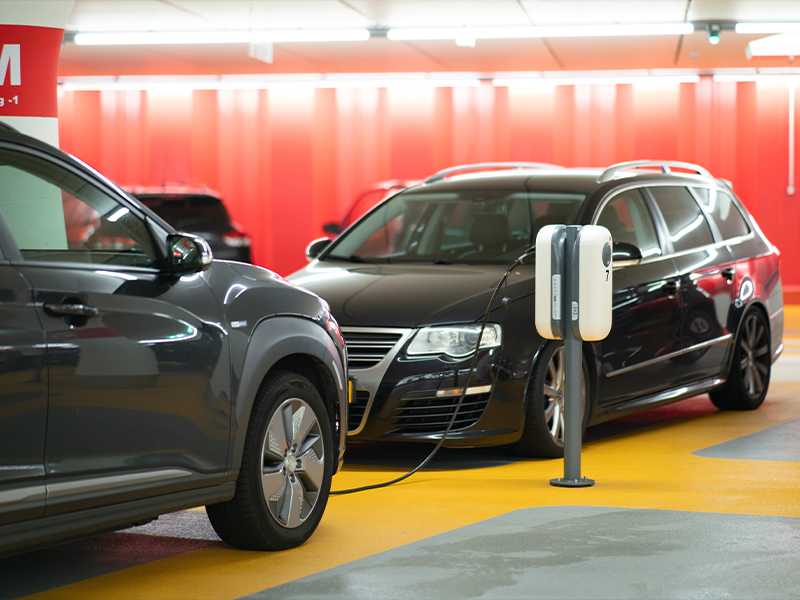Electric Vehicles
An electric vehicle is propelled by an electric motor, rather than a traditional petrol or diesel engine. The electric motor is powered by rechargeable batteries that can be charged using household mains electricity via an EV charge point at home or at a more powerful EV charge station at work or in the street.
nnHow can India transit to electric vehicles?
nElectric vehicles promise zero tailpipe emissions and a reduction in air pollution in cities. The Indian government has created momentum through its Faster Adoption and Manufacturing of (Hybrid &) Electric Vehicles schemes that encourage, and in some segments mandates the adoption of electric vehicles (EV), with a goal of reaching 30% EV penetration by 2030. The scheme creates demand incentives for EV and urges the deployment of charging technologies and stations in urban centers. If these aims are realised by 2030, they will generate an estimated saving of up to 474 Millions of tonnes of oil equivalent (Mtoe) and 846 million tonnes of net CO2 emissions over their lifetime.
Various fiscal demand incentives have been put in place to spur the production and consumption of EVs and charging infrastructure – such as income tax rebates of up to INR150,000 ($2,100) for customers on interest paid on loans to buy EVs. To scale production of lithium-ion cell batteries, there will be an exemption from customs duties to bring down their cost
Assuming the appropriate infrastructure is in place, 90% car owners in India are willing to switch to EVs, according to a survey by the Economic Times in May 2019. At present, however, EV market penetration is only 1% of total vehicle sales in India, and of that, 95% of sales are electric two-wheelers.
The automotive industry players and charging infrastructure, batteries and mobility service providers have taken various actions to ramp up industry action. Companies are designing and testing products suitable for the Indian market with a key focus on two-wheelers and three-wheelers. Ola, an Indian taxi company, has launched u201cMission: Electricu201d to integrate 10,000 e-rickshaws and electric auto-rickshaws into its fleet. Car manufacturer Mahindra and Mahindra is investing INR18 billion over the next three years into EV production to ramp up its four-wheeler production. Other manufacturers are forging partnerships with states to augment their public transport systems. Some of the lightweight motor vehicles manufacturers such as Hero Motocorp, Bajaj Auto and TVS remain unequivocally aligned with the governmentu2019s vision; however, they are proposing a more cautious, clear and realistic roadmap towards the adoption of EVs. To meet the government’s new Bharat Standard-VI emission regulations will cost the car industry an estimated INR70 billion – and with the mandate to replace conventional internal combustion engines within the next five years, companies are feeling the burn on their balance sheets. Battery manufacturers such as Amara Raja are taking concrete steps towards enhancing its research and development capabilities to develop battery packs for electric mobility. Indian Oil, National Thermal Power Corporation and Tata Power have big plans to proliferate electric charging stations throughout cities.
Emergence of new JOBS
nElectric vehicles will create new areas to work upon which are not common now but will be heavily required in coming future.
Some of the jobs that will be available for automobile engineers related to electric vehicles in future will be:
Jobs related to battery segments
Since electric vehicle is mainly about batteries. So this part will create major job opportunities . Some opportunities related to this segments are:
a) Battery Management System Engineers : Though it is still available in current automotive market but with the incoming of fully electric vehicles ,the battery capacity(from 12/24V to 352V) and hence expertise needed in this domain will increase and so will the requirement for this profile.
b) Battery Algorithms Engineer : This includes modeling, developing, specifying, and implementing control and estimation algorithms for high voltage battery. This is mostly related to increasing the battery efficiency and observing its behavior over a period of time . Ability to analyze the algorithm and hands on experience with MATLABSimulink will be useful.
c) Battery Safety Engineer : This is mostly related to the safety check of battery being used in the automobile. This might include performing destructive tests on batteries to better understand their properties, testing batteries for safety protocols etc.
Other related jobs
na) Power train Engineers : Since the electric vehicles will have completely different power train system as the old IC engines will be replaced by the battery system. This will change the driveline system for the vehicle. So having a proper know how of electric power train system might give you advantage and land you into new job.
b) Telematics/Data Analytics Engineer : This is not directly related to electric vehicle but with the commencement of cloud computing and connected driving, it might be possible that automobile companies collect the vehicles data in real time scenarios through wireless technology to observe battery behavior in various terrains and drive cycle and improving its performances based on these data. So this might be the most sought out job in coming time.
Apart from these there are many other ways in which new job opportunities might come because of electric vehicles like development of charging stations, R&D on improving battery quality and its life etc.



